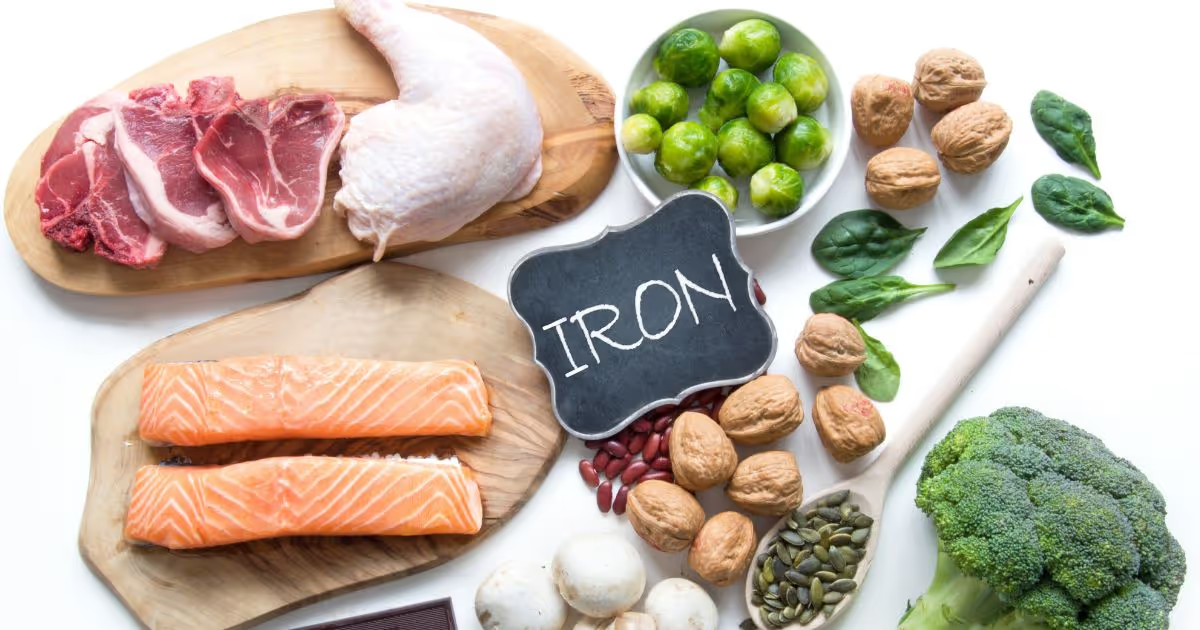What are the roles of iron?
Iron is a vital mineral necessary for red blood cell production, oxygen transport to body organs, and the synthesis of certain hormones. Its advantages are manifold, including fortifying the immune system, enhancing sleep, and supporting pregnant women. Iron-rich foods are meat, legumes, and dark green vegetables. Additionally, iron supplements are an option for those with iron deficiency, but consulting a doctor is vital to prevent excessive supplementation and potential side effects.
Beneficial effects of iron
Iron offers a wide array of health benefits, such as:
- Hemoglobin production
- Immune system support
- Skin nourishment
- Reduction of dark circles
- Improved sleep quality
- Enhanced memory
- Reduced fatigue
- Enhanced sports performance
- Hair Health
- Stronger pregnancies
What are the Adverse Effects of Excessive Iron Consumption?
Excessive iron intake can have adverse effects on health, leading to:
- Nausea
- Abdominal pain
- Constipation
- Diarrhea
- Vomiting
- Inflammation of the stomach lining
- Peptic ulcers
- Reduced zinc absorption
- Convulsions
Recommended Daily Iron Intake
The recommended daily iron intake varies by age and gender:
- Children aged 1-3 years: 9 milligrams
- Children aged 4-8 years: 10 milligrams
- Boys aged 9-13 years: 8 milligrams
- Boys aged 14-18 years: 11 milligrams
- Girls aged 9-13 years: 8 milligrams
- Girls aged 14-18 years: 15 milligrams
- Men aged 19 years and older: 8 milligrams
- Women aged 19-50 years: 18 milligrams
- Women over 51 years: 8 milligrams
- Pregnant women: 27 milligrams
- Breastfeeding mothers: 9-10 milligrams
Effects of Iron-Deficiency Anemia
Iron deficiency anemia often occurs in individuals who lose blood or do not consume animal products. Its symptoms may include digestive problems, fatigue, weakness, reduced energy, cognitive issues, lowered immunity, temperature regulation difficulties, and learning disabilities in children.
Foods Rich in Iron
- Iron-rich foods include:
- Poultry like chicken and duck
- Red meat, especially lean cuts
- Organ meats like liver
- Eggs
- Fish such as salmon, tuna, and sardines
- Shellfish
- Dark leafy greens like spinach and broccoli
- Legumes like lentils, green peas, white and red beans
- Whole-grain bread, pasta, and oatmeal
- Raisins
- Tofu
Enhance Iron Absorption with Vitamin C
To boost iron absorption, consume foods rich in vitamin C, such as strawberries, citrus fruits, tomatoes, and bell peppers, alongside iron-rich meals.
Who Needs Iron Supplements?
People who might require iron supplements include:
- Infants, especially premature or low birth weight babies
- Women during menstruation (needing twice as much iron as men)
- Pregnant women
- Frequent blood donors
- Individuals with iron-deficiency anemia, gastrointestinal disorders, cancer, or heart failure
Iron and Interactions: What to Avoid
Iron is best absorbed on an empty stomach but may cause nausea, vomiting, and diarrhea. Consult a physician for proper doses of iron supplementation.
Avoid consuming iron with certain foods or medications as it may decrease their effectiveness, including:
- Dairy products
- Calcium supplements
- High-fiber foods like fresh vegetables, whole grains, and bran
Caffeine- Antacids
- Penicillin
- Ciprofloxacin
- Medications for Parkinson's disease and epilepsy.
Iron is an essential mineral with numerous health benefits, including preventing anemia, strengthening the immune system, and promoting sleep quality and fetal health. Iron deficiency causes a lack of concentration, fatigue, and anemia. Iron-rich foods can help alleviate iron deficiency, and vitamin C enhances iron absorption. However, it is crucial to ensure a balanced intake and consult a healthcare professional before taking iron supplements to prevent overloading iron.

